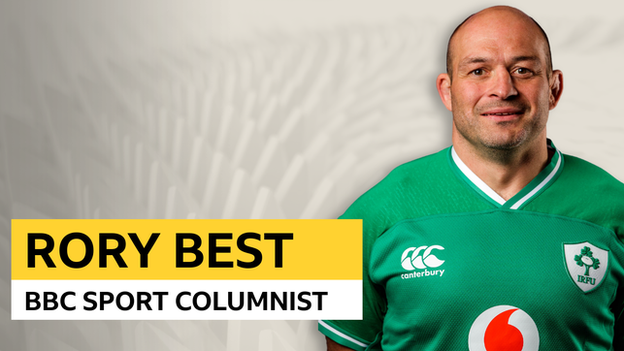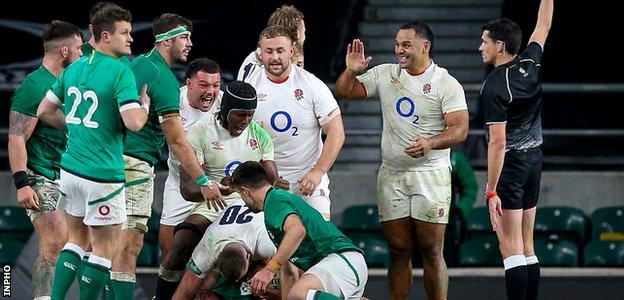Rory Best: 'On and off the pitch, CJ Stander has always put team over self'
- Published

People ask you how you know when it is time to retire, and the honest answer is you just feel it in your stomach.
If CJ Stander felt a sense of relief when the announcement came out on Tuesday, he will have known it was the right decision.
He will know in his heart that it is the right call, and he is not someone who would do something like this half-hearted.
I was lucky to captain CJ from his first Test start until I retired and what he gave in every game was a priceless loyalty.
You know you can rely on him, no matter what way you go he will be 100% behind you because he believes in the importance of the team over self.
When you say things in a changing room as a captain you want to believe people are buying into it. You can't underestimate the confidence CJ gives other leaders, when they say something he is looking at you nodding and you know he is going to give you everything to put what you're saying into practice.
As a player, CJ is one of those rare breeds who will only want to carry harder the more he gets knocked down.
Emotionally and physically, he is relentless. You can hear it now more than ever without crowds, when Ireland go to the scrum you will always hear CJ's voice.
"Come on front row, come on boys let's go". It is constant, and the more tired he gets the louder he becomes. These are the differences he makes outside of his immense rugby ability, they are massive energisers and they are so hard to find.

Best was Stander's international captain for three-and-a-half years
People are divided on the residency rule. What I can say unequivocally is that if every overseas player had CJ Stander's attitude to being an Irish rugby player and to representing the Irish jersey, it would only be a good thing.
I'm sure it wasn't the jersey he grew up wanting to represent, but that buy-in and emotion has made CJ a shining example of why the residency rule can be a huge positive.
So how can Ireland replace him?
They need to find somebody who can bring what he has brought.
The reason he was a big part of the successful 2018 team, and the reason he was able to come back from the red card in South Africa which broke his heart, is his durability.
He has come back from criticism, he has never failed to front up and he rarely misses a game because he will just turn up.
Ireland now need another number eight to step into that role just as CJ did when Jamie Heaslip retired.
You can build a back row around one mainstay. It was Jamie, then it was CJ, now Ireland are going to need someone else.
They can't have a number eight that is class one week but doesn't show up the next. That is now the big question, can Ireland find a mainstay to fill the void CJ will leave behind?
Time for Ireland to narrow gap to England
CJ's announcement aside, it remains a huge week for Ireland.
Even though neither side is playing for the title, there is a lot riding on Saturday's game against England.
Wales have shown that they are capable of bridging the perceived gap to England and France, now it is time for Ireland to follow suit.
A win could be the difference between finishing third or fifth in the table. You feel that a second consecutive third-place finish for Ireland, given all the change and disruption in the last two years, would provide a platform to work with, but coming fifth would leave a sour taste.
Regardless of the table, Ireland need this win. They need to prove that they are up there with England.
Ireland haven't beaten them since 2018. They have lost the last four games and have been physically dominated in each one.

England have dominated the physical battle in recent meetings with Ireland
This is a fact that England will take a lot of confidence from, but Ireland will not be focusing too much on. They will be using it as a motivation but their preparation won't be based on recent encounters, you don't want to dwell on negatives.
They want to be moving forward and for Ireland, whether they talk much about it or not, the physical domination has been what has killed them in the last four games.
England have been all over them at the breakdown and the line-out. Ireland are vastly improved in both areas, so there is reason to believe they can turn the tide this time.
Whether it's line-out defence, maul attack or the scrum, there is an area that England go to during their purple patch in a game because they think they can use it to turn the screw and take away the opposition's belief.
Ireland are going to need an area they can turn to when England are on top to stop their momentum and wrestle back control.
They need to quickly establish where England do not want to go and they need to take them there.
Character came through despite wobble at Murrayfield
Ireland's near collapse against Scotland was fair reflection of where they are at the minute. You cannot underestimate how much of the game is mental at this level.
When a team is playing with confidence, are 100% settled and know exactly what they're about, they would usually kick on having established a 14-point lead.
When the pressure came on they retreated slightly into their shells and turned it into a closer game than it should have been.
What they can take from it though is that at 24-24 they showed the character needed to get a win when they were on the verge of a confidence-destroying draw.
But they won. They will take confidence from the fact that they had the 14 point lead, and they will take confidence from the character they showed to get over the line.
The performance was less fast and loose than it was against Italy, but that was probably by design as opposed to a misfiring side.

Ireland left Murrayfield with four points having given up a 14-point lead
Historically a tight and physical approach is the way Ireland have beaten Scotland. They aren't the sort of team you go out and try to play too much against because they love the unstructured game, the balls bouncing around and working off turnovers.
It felt like Ireland were set up to play a bit more physically, a bit more abrasive - and it yielded results.
They hammered Scotland at the attacking and defensive breakdown, they kept the ball for long periods, they made it tough for them and then utterly controlled the line-out.
Ultimately the Six Nations is about finding a winning brand of rugby. As a team you go down the road that you think will lead to a win, that's not to say you aren't constantly evolving or trying to be better, but when the pressure is on the only option is the gameplan that maximises the chances of winning.
It will be the same on Saturday, we want to see Ireland stand toe-to-toe with England up front, and get the better of them at the set-piece. Above all else, we want to see them win.